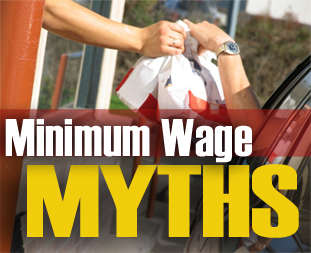The Minimum Wage Myth May Be Ending genre: Econ-Recon & Polispeak & Six Degrees of Speculation

The myth that raising the minimum wage will hurt low income wage earners by hindering job growth is being met with increasing skepticism. The rationale that it is better to pay millions of Americans poverty level wages than to increase that wage because it might not create more jobs is not only counterintuitive, it is absurd. Bloomberg has the full story here.
A moderate increase in the minimum wage won't raise unemployment among low-skilled workers, according to recent studies, many economists say. They are joined by some business executives who say they can live with that, especially if it's coupled with tax relief.
I find it ironic that business executives have suddenly decided that a wage increase might be a good thing when it is tied to a decrease in the estate tax. Clearly, if they now favor the minimum wage increase, one can assume that the Republican tax giveaways had to exceed the potential increase in costs...once again reinforcing the Republican propensity to shower more wealth on those who already hold the lions share.
A turning point in the debate came in the 1990s as states such as New Jersey began boosting their mandated wages above the federal level.
In 1995, Princeton economists David Card and Alan Krueger published research on unemployment trends among fast-food restaurants in New Jersey and neighboring Pennsylvania. They found that the number of jobs rose in New Jersey compared with Pennsylvania, even though New Jersey had a higher minimum wage.
The study, while not perfect, "provided evidence that went against the common view,'' Solow says."It changed the way many economists look at minimum wage.''
Explanations include cost savings from reduced job turnover, increased productivity as a result of better worker morale and the attraction of higher-quality employees through higher wages, Blinder says.
Frankly, the fact that experts are just beginning to acknowledge the fact that employee morale, turnover, and productivity might be tied to wages is mind-boggling. If it makes sense to pay CEO's huge salaries to turn around the performance of a struggling company, why wouldn't it also make sense that low wage employees can be similarly motivated...and likely have a much greater impact on a successful company turnaround?
A boost in the minimum wage would benefit about 15 million people, according to the Economic Policy Institute, a Washington research group partially funded by labor unions. Jared Bernstein, a senior economist at the institute, estimates that the average minimum-wage worker generates 54 percent of his or her family's total weekly earnings.
"The social consequences of raising the wage have become increasingly important,'' says Nobel Prize-winning economist Joseph Stiglitz, former chief economist for the World Bank in Washington and now a professor at Columbia University in New York.
We hear politicians talking about the benefits of programs to provide opportunities for underprivileged children and yet they fail to make the socioeconomic connections related to a minimum wage increase. If education is important to upward mobility, it certainly follows that a stable home environment (enough money to function) will impact the likelihood that children from poor families can obtain the full benefit that education offers. Is there any doubt that dropout and crime rates are linked to poverty? Frankly, it’s about time that some measure of honesty is being applied to this issue. Hopefully a bill that is actually focused on the interests of low wage families can be passed in the near future.
Post a comment